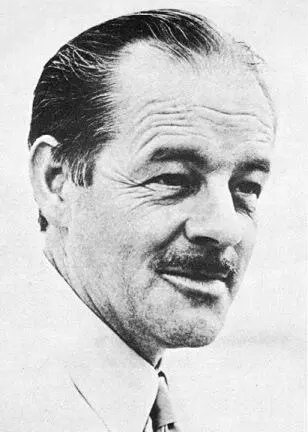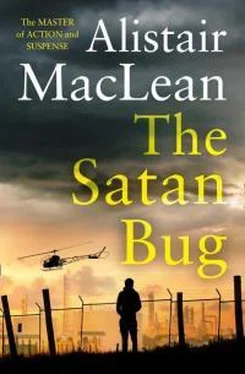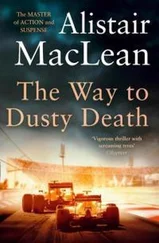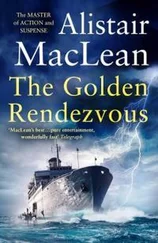Алистер Маклин - The Satan Bug
Здесь есть возможность читать онлайн «Алистер Маклин - The Satan Bug» — ознакомительный отрывок электронной книги совершенно бесплатно, а после прочтения отрывка купить полную версию. В некоторых случаях можно слушать аудио, скачать через торрент в формате fb2 и присутствует краткое содержание. Год выпуска: 2011, Издательство: Sterling, Жанр: Боевик, Шпионский детектив, на английском языке. Описание произведения, (предисловие) а так же отзывы посетителей доступны на портале библиотеки ЛибКат.
- Название:The Satan Bug
- Автор:
- Издательство:Sterling
- Жанр:
- Год:2011
- ISBN:нет данных
- Рейтинг книги:3 / 5. Голосов: 1
-
Избранное:Добавить в избранное
- Отзывы:
-
Ваша оценка:
- 60
- 1
- 2
- 3
- 4
- 5
The Satan Bug: краткое содержание, описание и аннотация
Предлагаем к чтению аннотацию, описание, краткое содержание или предисловие (зависит от того, что написал сам автор книги «The Satan Bug»). Если вы не нашли необходимую информацию о книге — напишите в комментариях, мы постараемся отыскать её.
The Satan Bug — читать онлайн ознакомительный отрывок
Ниже представлен текст книги, разбитый по страницам. Система сохранения места последней прочитанной страницы, позволяет с удобством читать онлайн бесплатно книгу «The Satan Bug», без необходимости каждый раз заново искать на чём Вы остановились. Поставьте закладку, и сможете в любой момент перейти на страницу, на которой закончили чтение.
Интервал:
Закладка:
Alistair MacLean
Originally published under the name Ian Stuart
THE SATAN BUG
1962
Alistair MacLean

Alistair MacLean, the son of a Scots minister, was born in 1922 and brought up in the Scottish Highlands. In 1941 at the age of eighteen he joined the Royal Navy; two-and-a-half years spent aboard a cruiser was later to give him the background for HMS Ulysses , his first novel, the outstanding documentary novel on the war at sea. After the war, he gained an English Honours degree at Glasgow University, and became a school master. In 1983 he was awarded a D.Litt from the same university.
He is now recognized as one of the outstanding popular writers of the 20th century. By the early 1970s he was one of the top 10 best-selling authors in the world, and the biggest-selling Briton. He wrote twenty-nine worldwide bestsellers that have sold more than 30 million copies, and many of which have been filmed, including The Guns of Navarone, Where Eagles Dare, Fear is the Key and Ice Station Zebra . Alistair MacLean died in 1987 at his home in Switzerland.
To Bill Campbell
Chapter One
There was no mail for me that morning, but that was no surprise. There had been no mail for me in the three weeks I’d been renting that tiny second-floor suite of offices near Oxford Street. I closed the door of the outer eight by ten office, skirted the table and chair that might one day house a receptionist if the time ever came that Cavell Investigations could run to such glamorous extras, and pushed open the door marked “Private.”
Behind that door lay the office of the head of Cavell Investigations, Pierre Cavell. Me. And not only the head but the entire staff. It was a bigger room than the reception office, I knew that because I’d measured it, but only a trained surveyor could have told it with the naked eye.
I’m no sybarite, but I had to admit that it was a pretty bleak sort of place. The distempered walls were of that delicate tint of off-grey pastel shading from off-white at floor level to off-black just below the ceiling that only London fog and the neglect of years can achieve. In one wall, overlooking a narrow grimy courtyard, was a tall narrow window, washed on the inside, with a monthly calendar close by. On the linoleum-covered floor a square desk, not new, a swivel chair for me, a padded leather armchair for the client, a strip of threadbare carpet to keep the client’s feet from getting cold, a hatrack and a couple of green metal filing cabinets, both empty. Nothing more. There was no room for anything more.
I was just lowering myself into the swivel chair when I heard the deep double chime of the bell in the reception-room and the sound of hinges creaking. “Ring and enter” the legend on the corridor door read and someone was doing just that. Ringing and entering. I opened the top left-hand drawer of my desk, pulled out some papers and envelopes, scattered them before me, pulled a switch by my knee and had just risen to my feet when the knock came at my inner door.
The man who entered was tall, thin and a close student of the Tailor and Cutter . A narrow-lapelled coat hung over an immaculately cut charcoal suit in the latest Italian line, and in his suéde-gloved left hand he carried his other glove, black bowler, briefcase and, a few inches up his wrist, a tightly-rolled, horn-handled black umbrella. He had a long pale narrow face, thin black hair parted in the middle and brushed almost straight back, rimless glasses, an aquiline nose and on the upper lip a thin black line that, on closer inspection, still looked like a thin black line, miniaturisation of the moustache brought to an almost impossible state of perfection. He must have carried a micrometer about with him. He looked for all the world like a top-flight City accountant: I couldn’t see him as anything else.
“Excuse my walking straight in like this.” He smiled briefly, three gold caps in the upper teeth, and half-glanced over his shoulder. “But it seems your secretary–”
“That’s all right. Please come in.” He even talked like an accountant, controlled, positive, slightly over-precise in the articulation. He offered me his hand, and the hand-shake, too, was in character, quick, neat, giving nothing away.
“Martin,” he introduced himself. “Henry Martin. Mr. Pierre Cavell?”
“Yes. Won’t you sit down, Mr. Martin?”
“Thank you.” He sat down gingerly, very straight, feet together, brief-case balanced with scrupulous care across his touching knees and looked around him slowly, missing nothing, a faint smile not showing his teeth. “Business not – ah – so very brisk these days, Mr. Cavell?”
Maybe he wasn’t an accountant after all. Accountants, as a rule, are polite, well-mannered and slow to give unnecessary offence. But then maybe he wasn’t feeling quite himself. People who came to see private detectives were seldom in a normal frame of mind.
“I keep it this way to fool the Inspector of Taxes,” I explained. “How can I help you, Mr. Martin?”
“By giving me some information about yourself.” He was no longer smiling and his eyes were no longer wandering.
“About myself?” My voice was sharp, not razor-edged, just the voice of a man who hasn’t had a client in all the three weeks he’s been in business. “Please come to the point, Mr. Martin. I have things to do.” So I had. Lighting my pipe, reading the morning paper, things like that.
“I’m sorry. But about yourself. I have you in mind for a very delicate and difficult mission. I must be sure you are the man I want. That is reasonable, I think?”
“Mission?” I looked speculatively at Henry Martin and thought I could get to disliking him without too much trouble. “I don’t carry out missions, Mr. Martin. I carry out investigations.”
“Of course. When there are investigations to carry out.” The tone was too neutral to take specific offence. “Perhaps I should supply the information. Please bear with my unusual method of approach for a few minutes, Mr. Cavell. I think I can promise that you will not be sorry.” He opened his brief-case, brought out a buff folder, abstracted a stiff sheet of paper and began to read, paraphrasing as he went along.
“Pierre Cavell. Born Lisieux, Calvados, of Anglo-French parents. Father civil engineer, John Cavell of Kingsclere, Hampshire, mother Anne-Marie Lechamps of Lisieux. Mother of Franco-Belgian descent. One sister, Liselle. Both parents and sister killed in air attack on Rouen. Escaped fishing-boat Deauville-Newhaven. While still in late teens parachuted six times into Northern France, each time brought back information of great value. Parachuted into Normandy D-Day minus two. At end war recommended for no fewer than six decorations – three British, two French and one Belgian.”
Henry Martin looked up and smiled thinly.
“The first discordant note. Decorations refused. Some quotation to the effect that the war had aged you fast and that you were too old to play with toys. Joined regular British Army. Rose to Major in Intelligence Corps, understood to have co-operated closely with M.I.6 – counter-espionage, I believe. Then joined police. Why did you leave the Army, Mr. Cavell?”
I’d throw him out later. Right now I was too intrigued. How much more did he know – and how? I said, “Poor prospects.”
“You were cashiered.” Again the brief smile. “When a junior officer elects to strike a senior officer, policy dictates that he should choose a man below field rank. You had the poor judgment to select a major-general.” He glanced at the paper again. “Joined Metropolitan Police. Rapid rise through the ranks – one must admit that you do appear to be rather gifted in your own line – to position of Inspector. In last two years seconded for special duties, nature unspecified. But we can guess. And then you resigned. Correct?”
Читать дальшеИнтервал:
Закладка:
Похожие книги на «The Satan Bug»
Представляем Вашему вниманию похожие книги на «The Satan Bug» списком для выбора. Мы отобрали схожую по названию и смыслу литературу в надежде предоставить читателям больше вариантов отыскать новые, интересные, ещё непрочитанные произведения.
Обсуждение, отзывы о книге «The Satan Bug» и просто собственные мнения читателей. Оставьте ваши комментарии, напишите, что Вы думаете о произведении, его смысле или главных героях. Укажите что конкретно понравилось, а что нет, и почему Вы так считаете.












